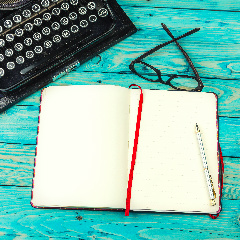As a writer of historical fiction, I’m always researching. It’s not just the big picture, either. Sure, I need to know the basics of life in the late 1800s, but I also need to know if a certain slang term was in use at that time, or what an expensive evening dress might have looked like.

Let’s look at the research process a bit, then. Your first step, of course, will be Google–maybe even Wikipedia. Just don’t make the mistake of thinking the latter is always correct. Remember that anyone can edit a Wikipedia article and write whatever they want. But Google will always net you a few gems you’ll want to bookmark and use over and over.
The trick to any search engine is to know your keywords. If you type “life in the late 1800s,” you’re going to get zillions of vague websites that don’t really tell you much at all. You need to narrow your search until you’re getting those laser-focused, scientifically-researched websites that will truly teach you what you need to know for your story. “Slang terms of 1870” is far better than “Slang in the Old West,” which is better than “Old-fashioned language.”
Your goal with Google (or whatever search engine you use) is the sort of website that reads like a scientific paper (“The Chinese as Medical Scapegoats: 1870-1905”) instead of a vague “The History of Chinatown.” In 99% of the cases, the more narrow the focus, the better the historical information included. Figure out exactly what you want to learn, then use that question as your search keywords.
Another good resource is the photograph site. Do the same sort of search, but add “photographs” to the keyword string. This will give you actual images of the period you’re researching, which you can use in your descriptions of setting, clothing, and even in character creation. Pinterest usually has some interesting photos, but they’re not likely to have the best descriptions of the images, the way a historical website will.
I’ve found that pretty much anything I’m interested in will have someone else who’s interested enough to create a website (or at least a blog entry). It’s rare that I can’t find anything at all, and in that case, I turn to the secondary research method (in today’s world, at least): the library. You’re not always going to be able to visit the library you really need, which will be the one in whatever city your story is set. Within those walls, you can find old newspapers (or microfiche copies), rare books about the city, “Who’s Who” books, and maybe even antique memorabilia from the time period you’re interested in. If you can afford the travel, visit the town’s library and ask the research librarian for help.
Old maps are also good research tools. You don’t need to invest in an original though–a good copy or photo of one will do nicely. Maps will tell you where the streets were, what areas were residential or business, and sometimes even what shops or businesses were in each district. I once found a map that showed every brothel in San Francisco within a certain time period–invaluable for the book I was writing at the time.
Finally, check out rare book dealers. You can often locate valuable information in small-print, local books like “Who’s Who” or those histories of city neighborhoods. A bookseller would be more familiar with what might be available, or can keep an eye out for books about whatever year you’re interested in. As an aside, while we’re talking about old books, you can often find antique books you can read online for free. Just find the name of a book you’d like to read and type in “read ___ online free” into the search bar and see if it’s available. I’ve found many interesting tomes that way.
Research is to historical fiction what muscle memory is to an athlete. It’s a necessary part of the writing process, whether or not you enjoy digging for information. What about you–have you found any tried-and-true research sites you return to over and over?
I saw a list of interview questions for authors the other day and one of the questions was “What genre do you secretly wish you could write and why don’t you?”

If I could do it, I’d like to write mystery stories. I like reading them (and watching them on film or television). I like trying to figure out “whodunnit” before the end of the book. But I don’t write it.
What’s stoping me? All the bloody red herrings, that’s what. My mind just doesn’t work like Agatha Christie’s or Arthur Conan Doyle’s. I start with a perfectly good idea, then can’t think of any clues for the investigator to follow. I guess I’m just not sneaky enough–or maybe I’m too sneaky and what seems obvious to me might not be that obvious to a reader. Whatever the reason, I can’t seem to get the clues lined up and tossed along the trail.
I’m reading a nice mystery story now: Still Life by Louise Penny. It’s the first in a series about Inspector Gamache, a Canadian policeman. So far, I’m enjoying it. The characters–both police and suspects–are all quirky and interesting. The reason for the murder is suitably inexplicable (as yet). It looks as if they’ve found the murder weapon–but I’m only about halfway through the book so I’m sure there’s some twist in their findings. The inspector will realize they forgot something essential and off he’ll go …
I’m also working on a series by Harry Bingham of Jericho Writers. His heroine is called Fiona Griffiths and she’s a UK policeman who has suffered from a rare psychological condition where she thought she was dead (it’s a real condition). This gives her a quirky, skewed outlook on life which makes the books interesting.
And yes, I do read several books at once. Sometimes, I’ll hit upon a story that I just have to rush right through and finish at once (The Ten Thousand Doors of January). Mostly, I read a little bit here, a little bit there, whatever I’m in the mood for when I have a few minutes of free time. I might have two or three mystery tales, a historical romance (guilty pleasure), some science fiction, and maybe even a contemporary novel or two. My moods change frequently, so I have to have something interesting in my Kindle at all times.
Perhaps in the future, I can figure out how mystery writing works. For now, I’ll stick to historical fiction where all I have to do is research the time period and put in enough action for my lads.
Fiction is a story that is all or partially made-up, something that didn’t or won’t (or might not) actually happen. Why do we love fiction so much? And should you love it too?
- Fiction allows us to use our imagination. You’re learning when you read non-fiction, but with fiction, you’re creating. You’re dreaming up a universe and living inside of it for awhile. Your creative side gets a good workout with a fiction novel or story.
- Fiction entertains us. Non-fiction is educational, but fiction is just plain fun. And you need some fun in your life sometimes.
- Fiction teaches us. Sure, non-fiction is educational, but fiction can teach us a lot, too. You can learn a lot by reading what the characters know and do in the story, and you can pick up facts about new places and ideas from reading fiction.
- Fiction improves our vocabulary. The more you read, the better your vocabulary gets, and the smarter you’ll be. Readers are good conversationalists for this reason.
- Fiction broadens our horizons. The more you read about different places, different cultures, different people and different ideas, the broader your mind will be.
You can see that reading — anything at all! — is good for your brain. If you’re a non-fiction reader, try some fiction once in awhile to see how much fun it can be.
Why do you read fiction?
